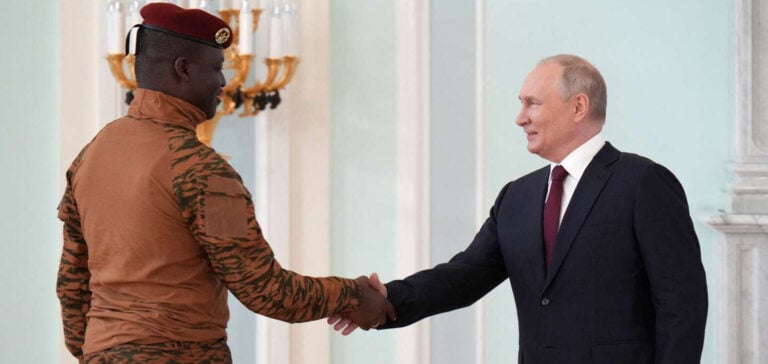Burkina Faso and Russia embark on a major energy partnership. This strategic alliance is aimed at the construction of a nuclear power plant, a major project that promises to provide a crucial response to the energy needs of a large part of Burkina Faso’s population, which has hitherto had limited access to electricity. Burkina Faso, under military rule since the previous year, is actively seeking to diversify its international partners and has found an ally in Russia to meet its growing energy needs. This partnership is a significant step for the country, and it is essential to understand the implications and reasons behind this decision.
Details of the agreement
The agreement, formalized by a memorandum of understanding, was signed during Russian Energy Week in Moscow, where Burkina Faso’s Minister of Energy, Simon-Pierre Boussim, was present alongside Nikolay Spasski, Deputy Director General of the Rosatom nuclear agency. This is the first agreement in the field of the peaceful use of atomic energy between Russia and Burkina Faso, according to Rosatom.
The central objective of this partnership is to bridge the energy gap in Burkina Faso, where, by the end of 2020, only 22.5% of the population had access to electricity. The vision is bold, with plans to build nuclear power plants by 2030, aiming to double the country’s electricity production, which would stimulate the industrialization of West Africa.
Challenges to meet
Building and operating a nuclear power plant is not without its challenges. According to Iyabo Usman, a South African researcher specializing in nuclear structures, Burkina Faso could face a shortage of qualified personnel to manage a nuclear power plant, and may have to call on foreign experts. In this respect, the International Atomic Energy Agency (IAEA) could play a crucial role, offering support, including financial, to Burkina Faso as a member state of the organization.
Burkina Faso will also have to navigate a complex geopolitical context. Researcher Usman highlights the competition between China and Russia for nuclear power plant investments in Africa, which adds a strategic dimension to this agreement.
Burkina Faso in transition
Since Captain Ibrahim Traoré seized power in September 2022, Burkina Faso has sought to diversify its international alliances. In particular, it has distanced itself from France, its historic partner, and strengthened its ties with Russia. Agreements, such as the announcement of grain deliveries by Moscow, bear witness to this new political direction.
Burkina Faso is also engaged in an alliance with Mali and Niger, two other Sahelian countries ruled by military regimes, as part of the Alliance of Sahel States, strengthening its defense cooperation.
It is essential to note that Burkina Faso faces considerable internal challenges, including deadly jihadist violence that has claimed thousands of victims and displaced millions. In this context, this partnership with Russia can also be interpreted as an effort to strengthen security and stability in the region.
Future prospects
The agreement between Burkina Faso and Russia to build a nuclear power plant is a bold step towards meeting the energy needs of a nation in transition. It highlights the challenges and opportunities facing Burkina Faso, while underlining the geopolitical implications of this collaboration. This partnership has the potential to strengthen Burkina Faso’s position on the international stage, but many obstacles need to be overcome to achieve this ambitious goal.





















